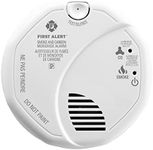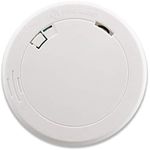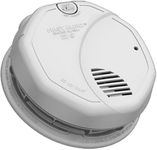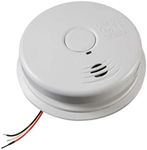Buying Guide for the Best Smoke Detectors
Choosing the right smoke detector is crucial for keeping your home and loved ones safe. Smoke detectors come in different types and with various features, so understanding what each specification means can help you make a smart decision. Think about where you want to install the detector, the size of your home, and any special needs you might have, such as hearing impairments or the presence of pets. The right smoke detector should be reliable, easy to maintain, and suitable for your living environment.Type of SensorSmoke detectors use different types of sensors to detect smoke: ionization, photoelectric, or a combination of both (dual-sensor). Ionization sensors are generally better at detecting fast-flaming fires, while photoelectric sensors are more responsive to slow, smoldering fires. Dual-sensor detectors combine both technologies for broader protection. If you want the most comprehensive safety, a dual-sensor model is a good choice. If you know your home is more at risk for one type of fire (for example, lots of paper or wood for smoldering fires), you might choose a detector that specializes in that area.
Power SourceSmoke detectors can be powered by replaceable batteries, sealed long-life batteries, or hardwired into your home's electrical system (often with a battery backup). Battery-powered models are easy to install and move, but require regular battery changes. Sealed long-life battery models offer up to 10 years of use without battery changes, making them low-maintenance. Hardwired detectors are more permanent and often interconnected, but require professional installation. Choose the power source that matches your comfort with maintenance and your home's setup.
InterconnectivitySome smoke detectors can be interconnected, meaning if one alarm goes off, all alarms in the system sound. This is especially important in larger homes or multi-story buildings, as it ensures everyone is alerted no matter where the fire starts. Interconnected alarms can be wired or wireless. If you have a large home or want maximum coverage, look for models that support interconnectivity.
Alarm Volume and AlertsThe loudness of the alarm is measured in decibels (dB). Most smoke detectors are designed to be loud enough to wake sleeping people, but some models offer extra-loud alarms or visual/vibration alerts for people with hearing impairments. If you have family members who are hard of hearing, or if you want extra assurance, consider a model with additional alert features.
Maintenance FeaturesSome smoke detectors have features that make maintenance easier, such as low-battery warnings, test buttons, and easy-access battery compartments. These features help ensure your detector is always working properly. If you want a hassle-free experience, look for models with clear maintenance alerts and easy testing options.
Smart FeaturesModern smoke detectors may offer smart features like smartphone notifications, integration with home automation systems, or voice alerts. These can provide extra peace of mind, especially if you travel often or want to monitor your home remotely. If you value connectivity and convenience, consider a smart smoke detector.
Certification and ComplianceLook for smoke detectors that meet recognized safety standards and certifications, such as those from UL (Underwriters Laboratories). Certification ensures the detector has been tested for reliability and effectiveness. Always choose a certified model to ensure your safety.














